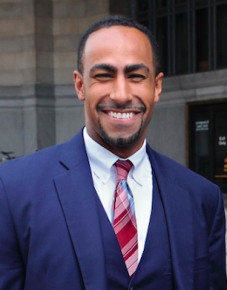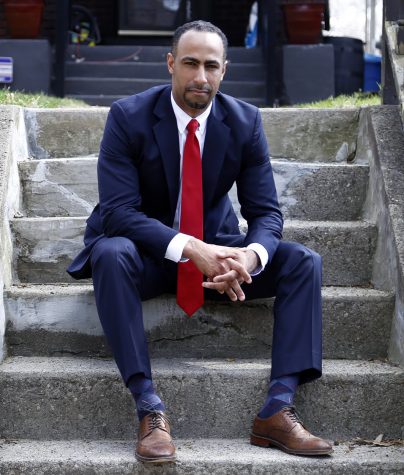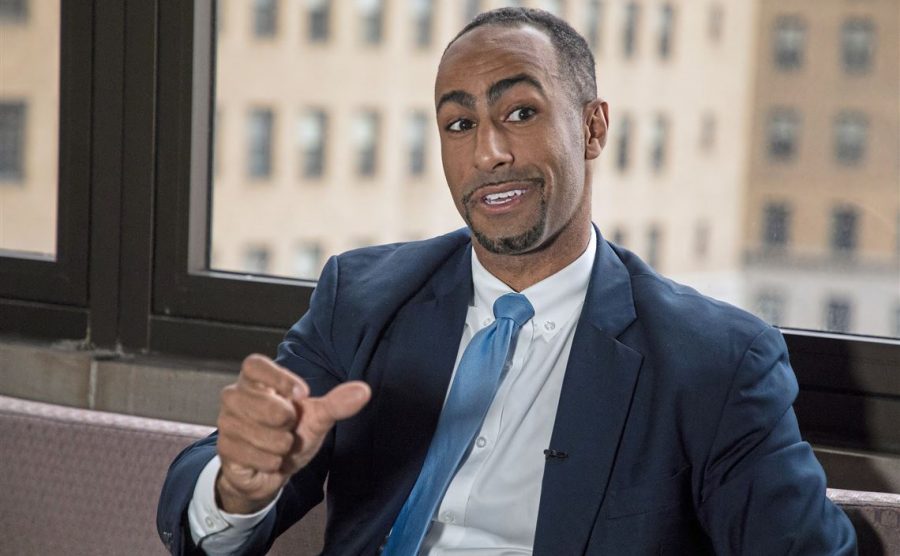Class of 2005 grad running for Congress
Jessie Wardarski, Post-Gazette
Jerry Dickinson, Shaler Area Class of 2005, is running for US Congressional seat in 18th district.
April 15, 2020
Jerry Dickinson graduated from Shaler Area High School in 2005. Since then, he has done much with his life. From Pittsburgh, to South Africa, to New York, to Philadelphia, and back to Pittsburgh, Dickinson has compiled an impressive reputation.
With a unique background that helps to shape his policies, Dickinson is running for Congress in the 18th district of Pennsylvania, which he hopes to make an important voice in the House of Representatives.
Dickinson lived in foster care and was adopted at a young age. He lived in what he called, “a multiracial Brady Bunch family.”
The experiences of his youth and the struggles of some of his siblings have had a permanent impact on him.
“Growing up, I’ve been intimately associated with poverty, and addiction, and incarceration, and joblessness, and homelessness, and the welfare system. These are my brothers and sisters who have been struggling… It has fundamentally shaped my worldview,” Dickinson said.

Growing up in Shaler and understanding the people that live in the district also helped Dickinson to form some of his beliefs. He particularly remembers his time covering the Millvale Flood of 2004 for The Oracle, and meeting to people affected.
“We were doing all we could to go down to Millvale and Etna and help, but at the same time report on it, and report on it accurately,” Dickinson said.
Following high school, Dickinson played Division I Soccer at the College of the Holy Cross in Worcester, Massachusetts. He studied Sociology and Political Science.
Dickinson received his law degree from Fordham University in New York City. While there, he provided legal services to tenants that were being evicted from their apartments.
“We helped to defend poor, mostly Latina and African-American, single mothers that were being evicted in Harlem,” Dickinson said.
Dickinson also served as a Clerk to Chief Judge Theodore McKee in Philadelphia. There, he helped formulate opinions on constitutional Law, civil rights, immigration, and criminal law.
“These decisions affected millions of Americans. It was a federal court, the next step from there is the Supreme Court,” Dickinson said.
Dickinson then returned to Pittsburgh and practiced law at Reed Smith, a firm downtown. There, he helped to found an organization that helps defend evictees in court, free of charge.
“Attorneys would do pro bono work on behalf of poor tenants in Allegheny County who were being evicted from their homes. Essentially, we would team up and represent them,” Dickinson said.
Currently, Dickinson is a professor at the University of Pittsburgh Law School, where he teaches Constitutional Law and Property Law.

Prior to that, Dickinson traveled to South Africa on a Fulbright scholarship to study the housing crisis in the nation.
“I did research, and I worked alongside South African lawyers in representing and advocating for poor squatters in the slums and shanty towns of Johannesburg,” Dickinson said.
His experience in property law shows in his politics. One of the most important issues on the Dickinson agenda is affordable housing.
Dickinson is a believer in tax credits for renters. Normally, in housing, these credits are reserved for homeowners exclusively, but Dickinson is seeking to expand this idea.
“If you are spending 25-30% of your annual household income on rent, you should get something back at the end of the year. So, one thing I propose to Congress is a renter refundable tax credit,” Dickinson said.
Dickinson believes that the 18th District, which encompasses the city of Pittsburgh and some of the South Hills, needs to be a leader in the House of Representatives. Without the worry of being unseated by a Republican in reelection, Dickinson can focus on truly progressive bills.
“Both sides, Republican and Democrat, have many old school incumbents that really are not really helping to move the needle on all the major issues, including the incumbent I am running against,” Dickinson said.
With this progressive power, he hopes to immediately begin introducing bills, if elected.
“One of the first things I would do [in Congress] is have a bill in my hand that bans solitary confinement… I would reroute a lot of that money to rehabilitation,” Dickinson said.
Other economic issues, such as minimum wage, are also found on Dickinson’s agenda.
“Minimum Wage should be raised to $15 per hour, immediately… the benefit of increasing it far outweighs the initial burden,” Dickinson said.
Dickinson has also used his knowledge of property law to study the Trump administration’s policies, specifically the border wall proposal.
The Washington Post published an editorial by Dickinson, explaining the issues behind the wall, in its Sunday edition.
“The discourse mainly centered around, ‘Is this moral?’, or ‘Is this immoral?’, but people hadn’t thought, ‘How are we going to get the land?’, a significant chunk of the land along the border is owned by private landowners,” Dickinson said.
Climate change is also high on the Dickinson agenda. He believes that Pittsburgh’s transformation can serve as an example in the House.
“We should be the leaders on climate change, given our post-industrial pollution regulations,” Dickinson said.
Dickinson has been campaigning on these ideas since April of 2018. He has spoken at numerous events at schools, churches, and union halls. With his ideals, policies, and youthful energy Dickinson hopes to win the Democratic primary election on April 28th.
There is still much left to do, but with Dickinson’s unique background in Shaler and his vast experience throughout the world, Dickinson has leadership and knowledge that is needed in Congress.
“What we are doing in this campaign is articulating a vision in a district that previously lacked one,” Dickinson said.


